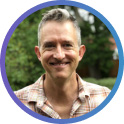
Human beings evolved in, and with, nature. How else would we have co-evolved with plants, eating their fruits and spreading their seeds; with microbes, who have taken residence in our guts to aid digestion; or by producing vitamin D from sunlight through our skin?
Yet now, it seems, we humans are largely disconnected from our natural evolutionary states. We spend the majority of our time indoors and separated from the sensory experience of being outdoors. The natural cues of light/dark, temperature, interaction with nonhuman beings, and need for movement are largely eliminated from our lives. Many scientists and clinicians have described how the rejection of our biological nature, this division from the earth, contributes to rising health problems in the United States, identifying root causes from both physiological and psychological perspectives. So what can we do about it? A simple solution might be to prescribe nature. Here’s why.
The Healing Power of Sunlight
Sunlight is required for our body to synthesize vitamin D, a nutrient that is linked to improved cardiovascular and immune health, including lower risk for disease. Exposure to natural light can decrease blood pressure and increase blood flow to tissues. In addition, our brains respond to sunlight, facilitating balance to our circadian rhythms; regulation of our biological cycles influences heart rate, blood pressure, metabolism, and immune function. Greeting the morning sun may support hunger/satiation and sleep/wake cycles. Bonus points for getting exercise, like walking, running, or biking, outside.
Sleeping Outside
Sleeping outside, or at least spending more time outdoors, can also help reset circadian rhythms and improve cardiovascular health. Studies have shown that one weekend camping outdoors syncs the internal clock with natural light-dark cycles, repairing the signals that are shifted due to our consumption of artificial light and tech screens. Sleeping outdoors may enhance sleep quality by reducing exposure to nighttime blue light and noise pollution. Better sleep quality is associated with lower stress levels, harmony of the nervous, endocrine, immune, and cardiovascular systems.
Thermal Therapy
Heat and cold exposure, such as saunas and cold plunges, have been used for centuries around the world to support physical and mental health. Both heat and cold exposure can have beneficial effects on cardiovascular health; heat and cold have effects on blood vessel dilation/constriction, stimulating the cardiovascular system to hone its homeostatic response (a “good” evolutionary, acute stressor known as hormesis). Heat exposure induces sweating, which may help eliminate toxins and improve circulation. Meanwhile, intentional cold exposure encourages controlled breathing and stimulates the vagus nerve, which plays a crucial role in regulating heart rate and blood pressure. Both heat and cold have profound anti-inflammatory effects. As a bonus, hot or cold therapy may be used as a psychological stress reduction tool. However, given its impact on heart function, temperature-based therapy should be approached with caution and cleared by a physician.
Human-Nonhuman Interactions
Being in nature invites relationship with nonhuman beings. In addition to developing a psychological interconnectedness with the environment, nonhuman beings interact with our bodies in really fascinating ways. First, sitting on the earth will create an opportunity for contact with environmental microbes, which are “old friends” that support the microbiome and regulate immune function. See our blogs on The Microbiome and Social Equity for more detail on this.
A new area of research is investigating the physiological effects of chemical compounds that are released by different plant species. For example, phytoncides are natural compounds emitted by trees and give a forest its fragrance; however, phytoncides also exhibit antimicrobial and anti-inflammatory properties. While little is known about the full range of effects of phytoncides, there is evidence that inhaling these compounds, even in a lab setting, modulates nervous system, immune, and brain activity that seems to enhance physiological health and mood. Forest bathing, the practice of combining mindfulness with being in a forest environment, reduces blood pressure, lowers heart rate, and decreases levels of stress hormones.







